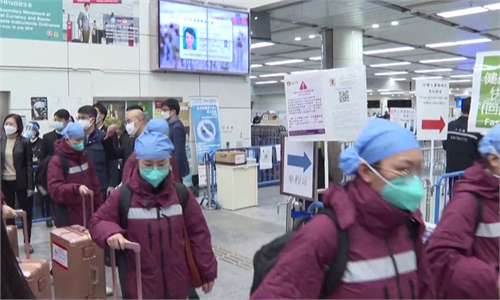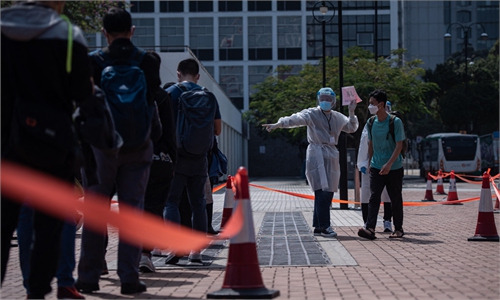China’s strict anti-epidemic policies contribute to growth of global economy: NPC spokesperson

A medical worker takes a swab sample from a citizen for nucleic acid test at a COVID-19 testing site in north China's Tianjin, Jan 15, 2022.Photo:Xinhua
Strict epidemic prevention and control measures have helped make China one of the most successful countries in fighting the pandemic, Zhang Yesui, spokesperson for the fifth session of the 13th National People's Congress, said Friday amid discussions and speculation of foreign media on when China, the only country that had been insisting on the strict dynamic zero-COVID approach, would relax its policies.
The dynamic zero-COVID approach is based on China's anti-epidemic strategy and experience. It involves discovering the infection source timely, conducting interfering measures quickly and treating the patients effectively. It is aimed at achieving the maximum outcome at a minimum cost, Zhang explained. He noted that the dynamic zero-COVID approach does not pursue zero infections but puts the outbreak under control as soon as possible.
"Thanks to the forceful and effective epidemic prevention and control measures, China has been able to maintain its economic and social development and contribute to the stability of the global industrial and supply chains, and the growth of the global economy," he noted.
Facts prove that China's dynamic zero-COVID approach has worked in China's context. It is the right way to go and the results are good, Zhang said, noting that the number of infections and fatalities and the economic data show that China is one of the most successful countries in fighting the pandemic.
Following moves of some foreign countries such as the UK to loosen travel and social restrictions, some Chinese netizens have been discussing on social media whether China should also relax its strict epidemic prevention and control measures, worried that continuing such strict measures would make the country fall behind other countries and regions to reopen in the post-pandemic era. Foreign media have also always paid attention to China's policy adjustment.
But Chinese experts noted that the dynamic zero-COVID approach is still the best policy for China in the short term.
China has collected experiences in resuming international exchanges after successfully holding the Beijing 2022 Winter Olympic Games, but we still need to enhance studies on the virus as well as research and development of vaccines and drugs, before we can confidently and unhurriedly reopen the borders, a health expert told the Global Times in a recent interview on condition of anonymity.
The main reason for some netizens calling for the reopening of borders is that data had shown the dominating Omicron variant is of high infectivity but low pathogenicity.
The expert noted that currently some of our understanding about the variant is made based on data mainly collected in Europe and the US. These regions have undergone serious epidemics and reached very high vaccination rates, which is very different from China's condition.
According to a prediction model conducted by a team led by Huang Jianping from Lanzhou University, if China relaxes restrictive policies, an outbreak occurs in the country would lead to more than 10 million infections, the Global Times learned from the team on Friday.
The team told the Global Times that, at current stage, China's strategy to prevent the return of a domestic outbreak and imported COVID-19 cases and the dynamic zero-COVID approach are still the best plan to deal with the pandemic.
In order to ease Chinese netizens' concerns over whether the country would lag behind in reopening, Zeng Guang, former chief epidemiologist of the Chinese Center for Disease Control and Prevention, noted on Monday that the West's "coexistence with the virus" strategy should not be taken as an alternative indicator of evaluating epidemic prevention in China.
Zeng explained that China and the West share the same scientific consensus on the Omicron variant of COVID-19, and the differences in countermeasures can be attributed to the different trajectories of epidemic prevention, the status of the epidemic, and socio-economic pressures.
The dynamic zero-COVID approach would not be in place forever and at an appropriate point of time, a Chinese-style roadmap for coexisting with the virus will present itself, Zeng said, making some foreign media speculate that China may be considering relaxing its dynamic zero-COVID approach.
But the Global Times found that in a Weibo post on January 26, Zeng said that, considering current severe epidemic overseas and outbreaks in China, the country should only enhance rather than relax current anti-epidemic measures.
The domestic conditions are also immature for reopening as the population has not built a strong immunity against the virus. For example, the antibody level of some inoculated people has declined, and some high-risk groups like the elderly have not been vaccinated yet and many have not received booster shots, Zeng explained.




